Information for patients
This leaflet can be made available in other formats including large print, CD and Braille and in languages other than English, upon request.
What is Cubital Tunnel Syndrome?
Cubital Tunnel Syndrome is a condition which is caused by irritation or compression (squeezing) of the nerve that runs down the inside of the elbow (where your funny bone is).
The nerve passes through tunnels made of soft tissue and ligaments on the way down to the hand. The tunnel at the elbow is called the cubital tunnel.
The nerve gives the little finger and ring finger sensation and provides some of the muscles in the hand with strength.
If the nerve is irritated or compressed (squashed) at the cubital tunnel you can experience different feelings, pain and weakness in the elbow, wrist and hand.
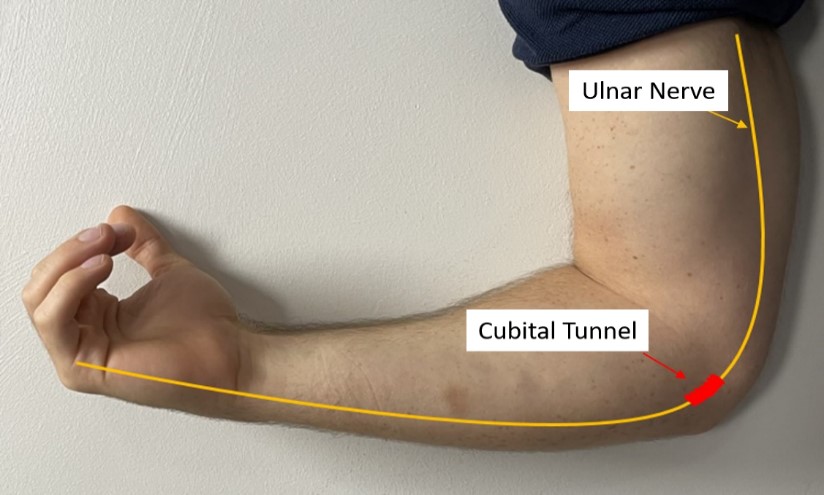
What causes Cubital Tunnel Syndrome?
Often the cause of Cubital Tunnel Syndrome is unknown. We do know that the ulnar nerve travels through a small tunnel at the elbow, and when you bend the elbow you slightly stretch the tunnel which squashes the ulnar nerve.
This is often why symptoms can be worse when the elbow is bent.
What are the symptoms?
The symptoms can be broken down into mild/moderate and severe.
Mild/Moderate symptoms:
- Reduced sensation to the little and ring fingers of the hand.
- Pins and needles in the little and ring fingers of the hand.
- Pain into the wrist and hand when leaning onto your elbow.
- Pain when the elbow is bent.
Severe symptoms:
- Constant numbness into the little finger and ring finger.
- Weakness in the hand and fingers.
- Reduced movement in the fingers and thumb.
- Muscle loss can be seen (particularly on the back of the hand in between the thumb and first finger as shown in the picture below).
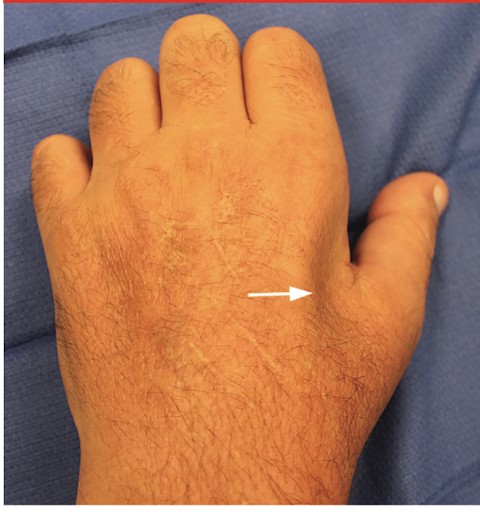
How can Cubital Tunnel Syndrome be treated?
Avoid doing things that make your symptoms worse.
For example:
- Avoid resting on your elbows e.g. when using a computer.
- Try to avoid long periods of time with your elbows in a bent position e.g. put your phone on loud speaker or use a headset instead of holding the phone to your ear.
- Try sleeping with your arm in a straight position instead of bent.
Exercise: Nerve gliding exercises can help to get the nerve moving within the tunnel, which in time can help to reduce symptoms and stop the elbow from becoming stiff.
Surgery: If symptoms do not settle with these changes and exercise, or symptoms are severe, the tunnel can be released to reduce any irritation or compression to the nerve.
What exercises can you do?
Ulnar Nerve Mobility Exercise:
- Start with your hand in an ‘OK sign’, with a slight bend in the elbow.
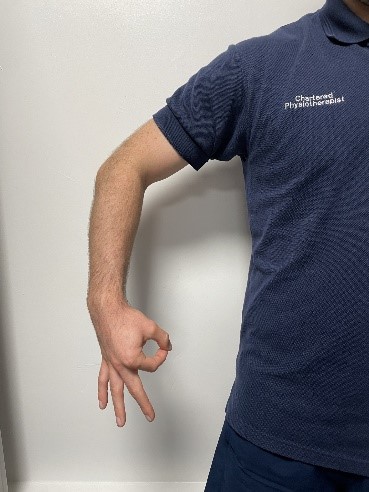
2. Keeping your hand in the same position, bring the hand over your shoulder by bending your elbow, so the palm of your hand is facing the ceiling.
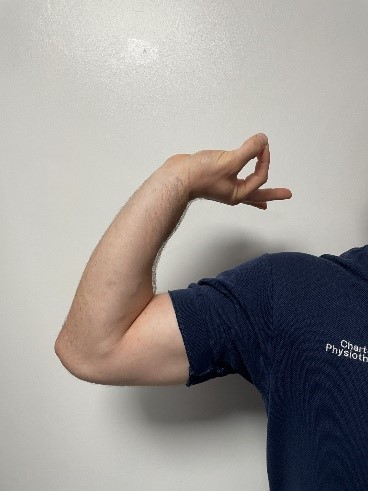
3. Straighten the elbow and return to the starting position.
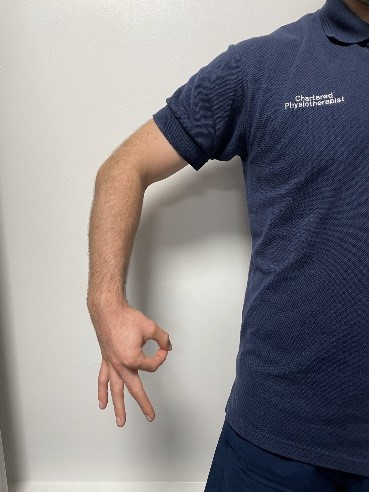
Perform 20 repetitions of the exercise, 4 to 5 times a day.
Note: DO NOT complete the exercise too fast. The symptoms can present quickly. Stop the movement at the point of slight discomfort or when your symptoms are reproduced.
What happens next?
If your symptoms do not improve in 3 months you can complete a self-referral to the Musculoskeletal Team by:
Fill in our online self-referral formWebsite: https://www.nth.nhs.uk/services/imsk-physiotherapy/referral-form/
Or by calling your G.P. to be referred back to the iMSK Hand Therapy Team.
Further Reading:
- The British Society for Surgery of the Hand
https://www.bssh.ac.uk/patients/conditions/22/cubital_tunnel_syndrome
- The American Academy Of Orthopaedic Surgeons
https://orthoinfo.aaos.org/en/diseases–conditions/ulnar-nerve-entrapment-at-the-elbow-cubital-tunnel-syndrome
Comments, concerns, compliments or complaints
Patient Experience Team (PET)
We are continually trying to improve the services we provide. We want to know what we’re doing well or if there’s anything which we can improve, that’s why the Patient Experience Team (PET) is here to help. Our Team is here to try to resolve your concerns. The office is based at the University Hospital of North Tees if you wish to discuss concerns in person. Our contact details are:
Telephone: 01642 624719
Freephone: 0800 092 0084
Opening hours: Monday to Friday, 9:30am to 4:00pm
Email: [email protected]
Out of hours
Out of hours if you wish to speak to a senior member of Trust staff, please contact the hospital switchboard who will bleep the appropriate person.
Telephone: 01642 617617
Patient, Public and People with Lived Experience
We are looking for patients to share their experiences of healthcare and to join our Involvement Bank. Working with the patients, carers, families and the general population we support in making decisions about their care can lead to better health outcomes, increased patient satisfaction and a better overall experience. We want to listen and work with you in shaping the future of your healthcare services. To find out more about the Involvement Bank go to our website or contact us at:
Website: www.nth.nhs.uk/about/community/people-with-lived-experience
Email: [email protected]
Data protection and use of patient information
The Trust has developed Data Protection policies in accordance with Data Protection Legislation (UK General Data Protection Regulations and Data Protection Act 2018) and the Freedom of Information Act 2000. All of our staff respect these policies and confidentiality is adhered to at all times. If you require further information on how we process your information please see our Privacy Notices.
Telephone: 01642 383551
Email: [email protected]
Privacy NoticesLeaflet feedback
This leaflet has been produced in partnership with patients and carers. All patient leaflets are regularly reviewed, and any suggestions you have as to how it may be improved are extremely valuable. Please write to the Clinical Governance team at:
Email: [email protected]
Leaflet reference: PIL1557
Date for Review: December 2027